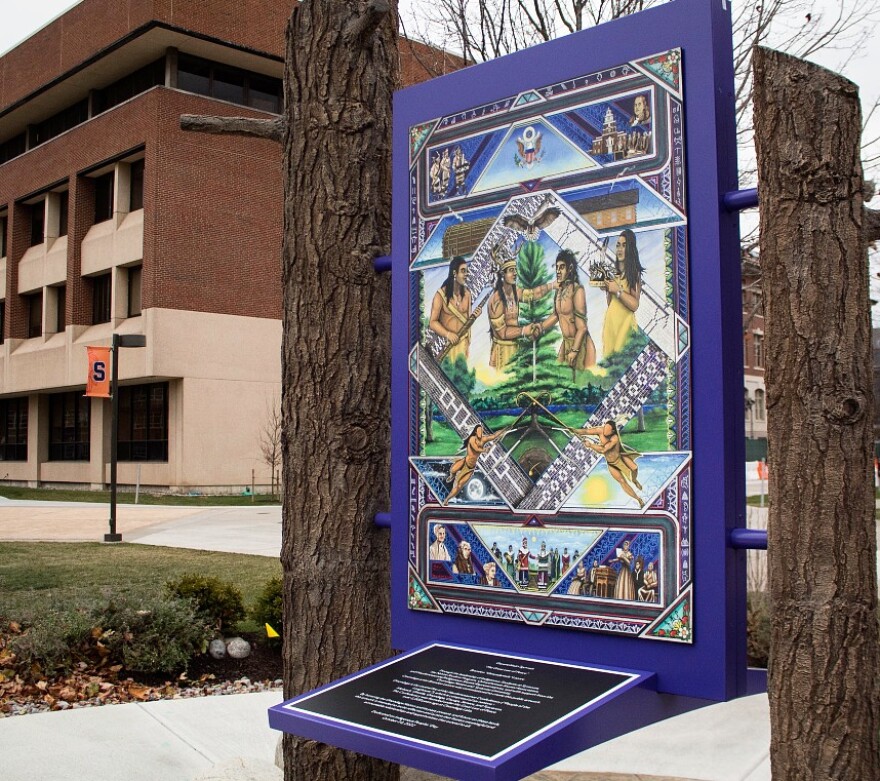Over the last ten years, Syracuse University has made a concerted effort to improve its relationship with the Haudenosaunee people, who’s land the university rests upon. Several initiatives are underway to improve indigenous representation at Syracuse and properly recognize their land claims. Despite the progress, many indigenous students still do not feel completely comfortable at Syracuse University, having to navigate cultural differences and ignorance from non-native classmates.
Different Connection
Kateleen “Kate” Ellis is a Syracuse University graduate and member of the Mohawk Nation. Kate is from the Canadian side of the Akwesasne Reservation, which spans from northwestern New York into Canada. When she first arrived at Syracuse, she didn’t feel the same sense of community as back home. The peaceful ambience of the Reservation had been replaced with the distracting noise of city traffic, and Ellis no longer felt the same connection with her surroundings.
“On the Reservation it’s definitely more quiet, it’s kind of almost hard to put into words what it’s like, I think the best way to describe it is it’s just so homey and you feel so connected in a way”, says Ellis
The environment of Syracuse University will never be as relaxing as Akwesasne, but Kate has been able to feel connected to her roots in other ways. Tammy Bluewolf-Kennedy, admissions counselor and Native American liaison to the Office of Admissions, was among several Syracuse staff that reached out to Ellis about the Native American Student Program. The student-run program connects indigenous students across campus and allows them to create a sense of community.
“[The Native American Student Program] was definitely huge, it allowed me to, kind of, create a family here similar to the one I had back home,” added Ellis.
Indigenous Knowledge & Western Academia

Still, Kate and other indigenous students often face students and professors that are uneducated on the Haudenosaunee people and their relationship to this region. She contends there is a misconception that Haudenosaunee students at Syracuse University are not deserving of their admittance into the school, but instead were chosen to fill a diversity quota. Some would point to the Haudenosaunee Promise Scholarship, a tuition scholarship only awarded to native students, as a sign of preferential treatment.
“In some of their classes, people thought that the native students at the school were here for free and that they had all these luxurious benefits…and that the only reason they got into this school, basically, was to support diversity,” Ellis recalled.
The issue, however, is far more nuanced when considering the contentious relationship indigenous people have had with Western academia for centuries. Historically, indigenous people throughout America were forced into residential schools and boarding schools where they were forced to cut their hair, dress to specific standards, and prohibited from performing traditional art. Ellis points out indigenous knowledge was intentionally neglected in favor of standardized Western schooling. Decades of forced assimilation and cultural erasure led to a deep distrust of the Western schooling system within indigenous communities, and upper education attendance rates were low.
“Indigenous knowledge just gets slipped under the rug when everyone’s listening to Westernized science, when indigenous people know this land better than anybody else,” said Ellis
Only in recent history has there been a reimagination of the relationship, where Western educational institutions are becoming appreciative and welcoming of indigenous knowledge and perspective, recognizing how it could enhance Western academia.
Podcast on Indigenous Experience
You can hear more about Kate and the Haudenosaunee student experience at Syracuse on Episode 6 of, “The Land You’re On” podcast. The episode follows an interview between Kate and Tehosterihens Deer, another Mohawk student at Syracuse University. Ellis and Deer share their triumphs and challenges as indigenous students at Syracuse, discuss their home lives, and share their gratitude for their experience at the university.
The Land You’re On is presented by Access Audio, and the Special Collections Research Center at the Syracuse University Libraries. The podcast is a limited edition, twelve-part series that will air on WAER’s website and all major streaming platforms. The series continues to reflect on the complicated history of our land, while also celebrating Haudenosaunee culture and traditions.


